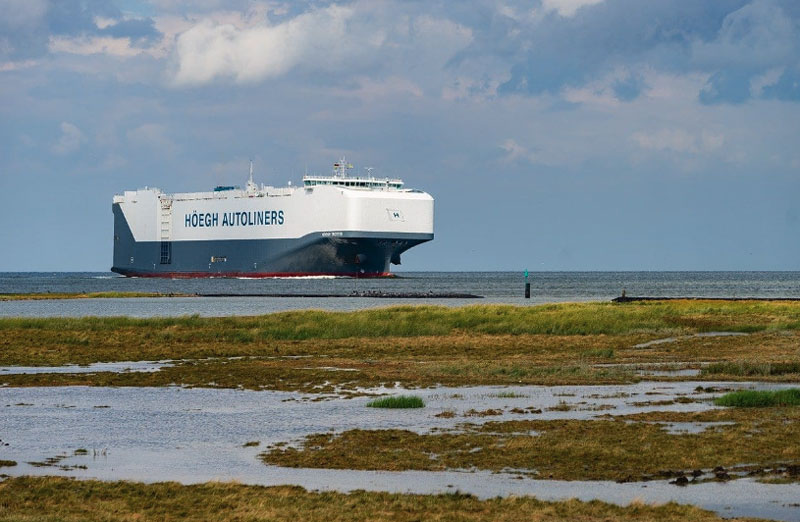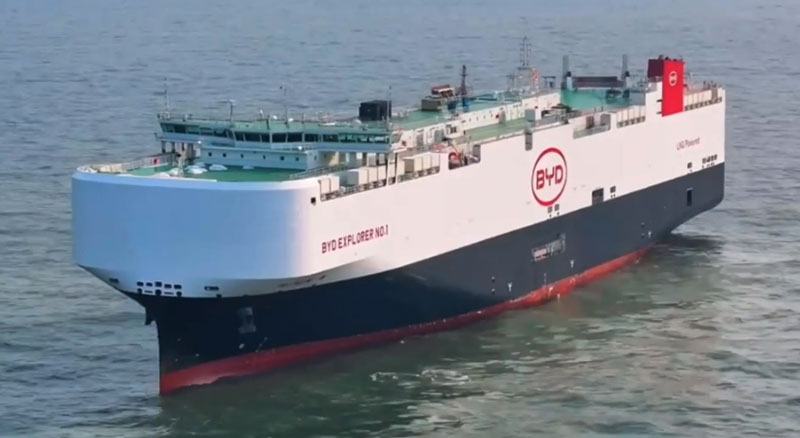

Geopolitics could lead to car carrier rates falling to half their current levels
The car carrier market has boomed in recent years on the back of China's explosive growth in electric vehicle exports, but Andreas Enger, CEO of Norwegian car carrier owner and operator Hoegh Autoliners, pointed out that as geopolitical moves to limit the expansion of Chinese automakers are gradually emerging, The boom may not last.
Enger said: "The motor transport industry has enjoyed an exceptionally good time over the past few years, and we are still at that stage. "The level of profit is very impressive, but it is unrealistic to say that it can be sustained forever."
"The boom in Chinese auto exports has helped create a shortage of capacity and has largely enabled us to choose our customers and thus increase rates." Andreas Enger said in an interview.
However, as Chinese automakers, including BYD and SAIC Motor, have expanded in markets such as Europe and Latin America, the geopolitical backlash has manifested itself in the form of tariffs. For example, temporary tariffs imposed by EU regulators imposed an additional 38 per cent on SAIC, while BYD paid an additional 17 per cent on top of the existing 10 per cent tariff. US President Joe Biden has promised to impose a 102.5 per cent tariff on Chinese electric vehicles this year, and Canada is considering similar measures.
Andreas Enger estimates that the order backlog for car carriers in China is about 50, out of a global total of about 700.
At the same time, car manufacturers are directly participating in the transport market, with companies such as BYD controlling the initiative by leasing or even buying transport vessels. Not only does this increase the resilience of the supply chain, it may also put competitive pressure on traditional car carriers.
In January this year, BYD Explorer 1 set sail for Europe, the ship capable of carrying 7,000 cars, by Zodiac Maritime Ltd. Managed and leased to BYD, which plans to add seven vessels over the next two years.
Enger believes these moves by automakers are understandable, especially after the logistical pain many companies have experienced during the coronavirus pandemic. "We see this as part of building a resilient supply chain."
Enger said: "The motor transport industry has enjoyed an exceptionally good time over the past few years, and we are still at that stage. "The level of profit is very impressive, but it is unrealistic to say that it can be sustained forever."

"The boom in Chinese auto exports has helped create a shortage of capacity and has largely enabled us to choose our customers and thus increase rates." Andreas Enger said in an interview.
However, as Chinese automakers, including BYD and SAIC Motor, have expanded in markets such as Europe and Latin America, the geopolitical backlash has manifested itself in the form of tariffs. For example, temporary tariffs imposed by EU regulators imposed an additional 38 per cent on SAIC, while BYD paid an additional 17 per cent on top of the existing 10 per cent tariff. US President Joe Biden has promised to impose a 102.5 per cent tariff on Chinese electric vehicles this year, and Canada is considering similar measures.

Andreas Enger estimates that the order backlog for car carriers in China is about 50, out of a global total of about 700.
At the same time, car manufacturers are directly participating in the transport market, with companies such as BYD controlling the initiative by leasing or even buying transport vessels. Not only does this increase the resilience of the supply chain, it may also put competitive pressure on traditional car carriers.
In January this year, BYD Explorer 1 set sail for Europe, the ship capable of carrying 7,000 cars, by Zodiac Maritime Ltd. Managed and leased to BYD, which plans to add seven vessels over the next two years.
Enger believes these moves by automakers are understandable, especially after the logistical pain many companies have experienced during the coronavirus pandemic. "We see this as part of building a resilient supply chain."





